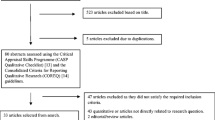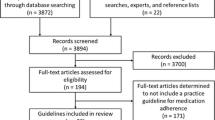Abstract
Aim
This literature study explores the impact of educational interventions about medicines for psychiatric patients on adherence, knowledge and economic, clinical and humanistic outcomes.
Method
A systematic review of eight electronic databases was carried out. Reference lists of primary studies were searched. Studies measuring the impact of medication information for adult psychiatric patients in an individual way on adherence, knowledge, economic, clinical and humanistic outcomes were included. Data analysis and assessment of methodological quality were executed according to the Cochrane Collaboration guidelines. A meta-analysis of primary studies was not suitable due to the heterogeneity of the primary studies.
Results
Literature search generated 17 studies. Thirteen studies measured adherence, seven of which reported an increase. Generally, adherence was 11–30% higher in the intervention groups than in the control group. A combination of oral and written information seemed to have an added value as compared with supplying exclusively oral or written information. The provision of easily readable written information improved adherence by 11%. Seven of the eight studies measuring knowledge reported an overall improvement. Knowledge was increased with 14–28% in interventions groups in comparison with control group. One study reported an increased satisfaction. No significant differences were seen for frequency of side-effects, relapse or admission rates, symptoms and quality of life. Not one of the 17 studies explored the economic impact of the educational intervention. The methodological quality of the included studies was variable. Individual studies suffered from a variety of biases and other methodological limitations.
Conclusion
The included studies suggested a positive impact on adherence and knowledge. As only one study assessed patient’s satisfaction, no definitive conclusions can be made. No significant differences were observed for frequency of side-effects, relapse or admission rates, symptoms and quality of life. Studies on the cost-effectiveness of such interventions need to be performed. In general, more well-designed studies with good methodological quality in this research domain are needed.

Similar content being viewed by others
References
World Health Organisation, Fact sheet No 265. The World Health Report 2001 on mental and neurological disorders, December 2001. http://www.who.int/mediacentre/factsheets/fs265/en/ (2 September 2004).
Lépine JP, Gastpar M, Mendlewicz J, Tylee A. Depression in the community: the first pan-European study DEPRES (Depression Research in European Society). Int Clin Psychopharmacol 1997;12:19–29.
Bromet EJ, Fennig S. Epidemiology and natural history of schizophrenia. Biol Psychiatry 1999;46:871–81
Angunawela II, Mullee MA. Drug information for the mentally ill: a randomized controlled trial. Int J Psych Clin Pract 1998;38:121–7.
Rheinstein PH, McGinnis TJ, Nightingale SL. The patient information and education initiative. Am Fam Physician 1995;52(8):2377–82.
Keller MB, Hirschfeld RMA, Demyttenaere K, Baldwin DS. Optimizing outcomes in depression: focus on antidepressant compliance. Int Clin Psychopharmacol 2002;17:265–71.
Haynes RB, McDonald H, Garg AX, Montague P. Interventions for helping patients to follow prescriptions for medications. The Cochrane Database of Systematic Reviews 2002, Issue 2. Art. No.: CD000011. DOI: 10.1002/14651858.CD000011. This version first published online: 22 April 2002 in Issue 2, 2002.
Pampallona S, Bollini P, Tibaldi G, Kupelnick B, Munizza C. Patient adherence in the treatment of depression. Br J Psychiatry 2002;180:104–9.
Dolder CR, Lacro JP, Leckband S, Jeste DV. Interventions to improve antipsychotic medication adherence: review of recent literature. J Clin Psychopharmacol 2003;23(4):389–99
Deijen JB, Kornaat H, Cloin PA. The effect of brochures and audiotape on efficacy and tolerability of venlafaxine in depressed outpatients: a single-blind parallel study in general practice. J Clin Psychiatry 2000;2:89–95.
Fawcett J. Compliance: definitions and key issues. J Clin Psychiatry 1995;56(S1): S4–10.
Thase ME. The clinical, psychosocial and pharmacoeconomic ramifications of remission. Am J Manag Care 2001;7(11):S377–85.
Eraker SA, Kirscht JP, Becker MH. Understanding and improving patient compliance. Ann Intern Med 1984;100:258–68.
Morris LA, Halperin JA. Effects of written drug information on patient knowledge and compliance: a literature review. Am J Public Health 1979;69:47–52.
Haynes RB, McKibbon KA, Kanani R. Systematic review of randomised trials of interventions to assist patients to follow prescriptions for medications. Lancet 1996;348:383–6.
McDonald HP, Garg AX, Haynes RB. Interventions to enhance patient adherence to medication prescriptions. JAMA 2002;288:2868–79.
Zygmunt A, Olfson M, Boyer CA, Mechanic D. Interventions to improve medication adherence in schizophrenia. Am J Psychiatry 2002;159:1653–64.
Vergouwen AC, Bakker A, Katon WJ, Verheij TJ, Koerselman F. Improving adherence to antidepressants: a systematic review of interventions. J Clin Psychiatry 2003;64:1415–20.
Roter D, Hall J, Merisca R, Nordstrom B, Cretin D, Svarstad B. Effectiveness of interventions to improve patient compliance: a meta-analysis. Med Care 1998;36(8):1138–61.
Svarstad BL, Chewning BA, Sleath BL, Claesson C. The brief medication questionnaire: a tool for screening patient adherence and barriers to adherence. Patient Educ Couns 1999;37:113–24.
Jasti S, Siega-Riz AM, Cogswell ME, Hartzema AG. Correction for errors in measuring adherence to prenatal multivitamin/mineral supplement use among low-income women. J Nutr 2006;136:479–83.
Thompson K, Kulkarni J, Sergejew AA. Reliability and validity of a new medication adherence rating scale (MARS) for the psychoses. Schizophr Res 2000;42:241–7.
Alderson P, Green S, Higgins JPT, editors. Cochrane Reviewers’ Handbook 4.2.2. [updated March 2004]. http://www.cochrane.org/resources/handbook/hbook.htm (accessed 4th November 2004)
Al-Saffar N, Deshmukh AA, Carter P, Adib SM. Effect of information leaflets and counselling on antidepressant adherence: open randomised controlled trial in a psychiatric hospital in Kuwait. Int J Pharm Pract 2005;13:123–31.
Azrin NH, Teichner G. Evaluation of an instructional program for improving medication compliance for chronically mentally ill outpatients. Behav Res Ther 1998;36:849–61
Chaplin R, Kent A. Informing patients about tardive dyskinesia: controlled trial of patient education. Br J Psychiatry 1998;172:78–81.
Kleinman I, Schachter D, Koritar E. Informed consent and tardive dyskinesia. Am J Psychiatry 1989;146(7):902–4.
Kleinman I, Schachter D, Jeffries J, Goldhamer P. Effectiveness of two methods for informing schizophrenic patients about neuroleptic medication. Hosp Community Psychiatry 1993;44(12):1189–91.
Ley P, Jain VK, Skilbeck CE. A method for decreasing patients’ medication errors. Psychol Med 1976;6(4):599–601.
Macpherson R, Jerrom B, Hughes A. A controlled study of education about drug treatment in schizophrenia. Br J Psychiatry 1996;168(6):709–17.
Munetz MR, Roth LH. Informing patients about tardive dyskinesia. Arch Gen Psychiatry 1985;42(9):866–71.
Myers ED, Calvert EJ. The effect of forewarning on the occurrence of side-effects and discontinuance of medication in patients on amitriptyline. Br J Psychiatry 1973;122:461–4.
Myers ED, Calvert EJ. The effect of forewarning on the occurrence of side-effects and discontinuance of medication in patients on dothiepin. J Int Med Res 1976;4(4):237–40.
Myers ED, Calvert EJ. Knowledge of side-effects and perseverance with medication. Br J Psychiatry 1978;132:526–7.
Myers ED, Calvert EJ. Information, compliance and side-effects: a study of patients on antidepressants medication. Br J Clin Pharmacol 1984;17(1):21–5.
Peveler R, George C, Kinmonth AL, Campbell M, Thompson C. Effect of antidepressant drug counselling and information leaflets on adherence to drug treatment in primary care: randomised controlled trial. BMJ 1999;319:612–5.
Robinson GL, Gilbertson AD, Litwack L. The effects of a psychiatric patient education to medication program on post-discharge compliance. Psychiatr Q 1986–87;58(2):113–8.
Wilkinson G, Allen P, Marshall E, Walker J, Browne W, Mann AH. The role of the practice nurse in the management of depression in general practice: treatment adherence to antidepressant medication. Psychol Med 1993;23(1):229–37.
Oei TP, KazmierczakT. Factors associated with dropout in a group cognitive behaviour therapy for mood disorders. Behav Res Ther 1997;35(11):1025–30.
Anderson IM. SSRIS versus tricyclic antidepressants in depressed patients: a meta-analysis of efficacy and tolerability. Depress Anxiety 1998;7(S1):11–7.
Brown CS, Wright RG, Christensen DB. Association between type of medication instruction and patients’ knowledge, side effects and compliance. Hosp Community Psychiatry 1987;38(1):55–60.
Coulter A: Evidence based patient information. BMJ 1998;317:225–6.
Coles GS, Roth L, Pollack IW. Literacy skills of long-term hospitalized mental patients. Hosp Community Psychiatry 1978;29(8):512–6.
Berg A, Hammitt KB. Assessing the psychiatric patient’s ability to meet the literacy demands of hospitalization. Hosp Community Psychiatry 1980;31(4):266–8.
O’Neil CK, Poirer TI. Impact of patient knowledge, patient–pharmacist relationship, and drug perceptions on adverse drug therapy outcomes. Pharmacotherapy 1998;18(2):333–40.
Frank E. Enhancing patient outcomes: treatment adherence. J Clin Psychiatry 1997; 58 Suppl 1: 11–4.
Acknowledgements
This research was supported by a grant of the Institute for the Promotion of Innovation through Science and Technology in Flanders (IWT-Vlaanderen).
Author information
Authors and Affiliations
Corresponding author
Rights and permissions
About this article
Cite this article
Desplenter, F.A.M., Simoens, S. & Laekeman, G. The impact of informing psychiatric patients about their medication: a systematic review. Pharm World Sci 28, 329–341 (2006). https://doi.org/10.1007/s11096-006-9054-2
Received:
Accepted:
Published:
Issue Date:
DOI: https://doi.org/10.1007/s11096-006-9054-2




